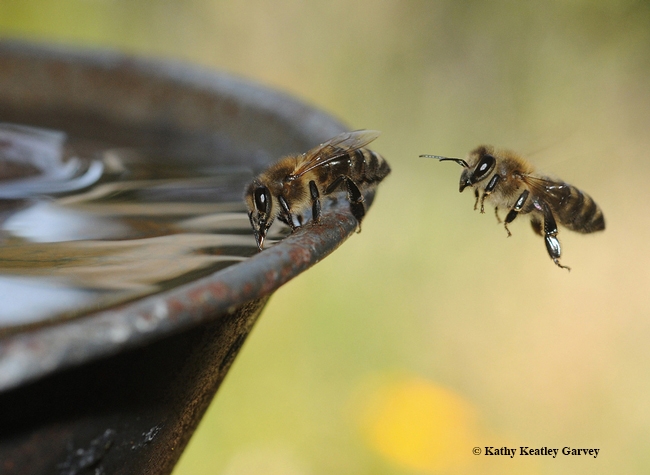If you're planning to join the ranks of backyard beekeepers in 2012, you should keep a few things in mind, says Extension apiculturist Eric Mussen of the UC Davis Department of Entomology.
Mussen, a member of the UC Davis Department of Entomology faculty since 1976, advises what to do and what not to do in his current edition of from the UC Apiaries.
One of the most important things, says Mussen, is not to become a laissez-faire beekeeper, that is, "place the bees in a hive and walk away, leaving the bees to fend for themselves." This can lead to serious problems for your colony and the health of your neighbors' colonies, he points out. Plus, it could lead to more stringent city and county ordinances.
You should always provide water for your bees on your property, Mussen says. Otherwise, they will visit the neighbor's "hanging laundry, bird bath, swamp cooler, dog dish, leaky hose connection, etc."
Mussen also advises:
--Use fencing or bushes to get the bees to fly up, then away from the apiary. "They will also attain that altitude on return flights.
--Use gentle stocks and "work" the bees during warm, nice middays. That "free" swarm you catch may not be of gentle stock (and it could be Africanized bee stock if it's collected in areas where Africanized bees are).
--Use smoke and slow, gentle movements.
--Inspect the brood periodically, twice a month, "to be certain that the queen is laying a good pattern, that the brood is healthy, and that there are adequate food stores for the time of year."
And, Mussen says, "if you need to feed the bees, start feeding after flight ends for the day, to help prevent robbing."
Mussen offers a wealth of information in his current newsletter, the other bimonthly editions (dating back to 1976), and Bee Briefs.
Bottom line: if you're going to keep bees, Mussen says, "be a beekeeper, not a bee-haver."
Attached Images:
